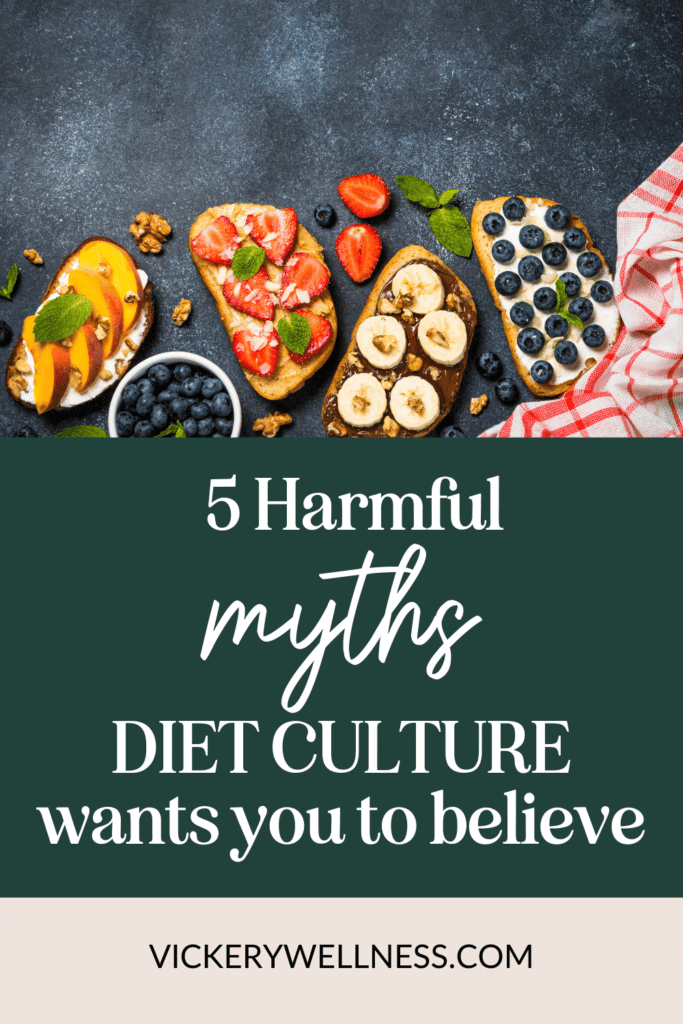It’s a vicious cycle. You’re unhappy with your weight (or feel the need to change it because of the anti-fat society we live in), so you give in to diet culture and go on the latest diet and exercise program that promises results. But then it doesn’t work out (pun intended) and you feel even worse about yourself than before. It can be tempting to just give up on health completely– but don’t! Diet culture myths have perpetuated the idea that weight loss is the only way to achieve health. However, there are many ways to find true overall health & wellbeing while learning how to love your body without focusing on the scale.
Read on for 5 diet culture myths that may surprise you

Myth #1 – You have to be thin to be healthy
Truth: You don’t have to be ‘thin’ to be healthy.
Diet culture (which is an over $78 Billion business) has really pushed the narrative that the only path to health and wellness is through starving ourselves and shrinking our bodies.
The research continues to show us that restrictive diets that focus on weight loss do not work in the long term. And that our bodies will fight tooth and nail when we try to be restrictive with our food intake. Not to mention that typically even after weight loss occurs, many people will gain the weight they lost back and more. This is what we refer to as chronic dieting or ‘yo-yo dieting,’ which can actually be more detrimental to our health than the proposed health issues correlated with a higher percentage of body fat.
You’re probably wondering, okay but how can I be healthy and not thin?!
That’s because being in a smaller body does not equal being healthier. Because health-promoting behaviors are what contribute to health and wellbeing. And the number on the scale is not a behavior.
You can focus on adding more fruits, vegetables, and joyful movement in a way that feels good to you. None of these have to focus on weight loss. That means your weight would do one of three things: 1) stay the same, 2) gain weight, 3) lose weight. The point is that a snapshot of your weight is not what tells you about your overall health.
Myth #2 – If you’re “overweight,” it’s your fault
Truth: BMI is bullsh!t and diets fail us, not the other way around
I think we have all known for a long time that BMI is bull. A calculation that literally only looks at height and weight is supposed to tell us if we are healthy or not? Outside of the arguments around how it doesn’t take into account fat and muscle mass, BMI has a pretty insidious history.
It was originally created by Adolphe Quetelet in 1832 (and called the Quetelet index). Quetelet was an astronomer, mathematician, statistician, and sociologist. Notice that none of these are healthcare-related professions. Even Quetelet stated that this calculation was meant to be a simple calculation to be used on a large population, not for individuals. Also of note, this measure was created only using French and Scottish white male participants. If you don’t fit into either of those boxes (and even if you do), then this measurement quite literally has no relation to you or your health.
Did you know that in 1985 the National Institute of Health tied their definition of ‘obesity’ directly to BMI? Then, in 1988 the NIH decided to change (read: lower) the threshold for overweight and obesity on the BMI scale, therefore making millions of Americans overweight/’obese’ overnight? The example in that article looks at a woman who is 5 foot 4 inches tall and with the threshold changes, it moves their ‘normal’ weight to be 10 pounds less than it was the previous day. Imagine waking up thinking you were ‘healthy’ and then all of the sudden because the goal post was moved, you are suddenly ‘unhealthy’ just because of this change in thresholds on a subpar calculation? Which does not take into account any other markers of health? All of a sudden you are at a higher risk on health and life insurance because someone decided to move the math around.
Myth #3 – Health is all about weight loss
Truth: Health is about health-promoting behaviors, not how much you weigh on the scale
From a simplistic standpoint, if overall health was only about weight loss/our body size, then almost all thin people would automatically be healthy. However, we know this is not true.
So what IS health?
I believe that health is subjective. We cannot say that health is the ‘absence of disease’ because that is simply not true or fair. Health for each individual is whatever they can safely do that helps their unique body feel its best.
Part of health is also having access to appropriate healthcare that is free from stigma.
You may also be wondering, what are health-promoting behaviors?
Here are some examples:
- Finding and participating in movement/exercise that you enjoy
- Adding more whole foods to your everyday meals
- Focusing on getting adequate sleep
- Adding more fruits and vegetables to your meals and snacks
- Increasing the amount of water you drink in order to stay hydrated
What you won’t see on a list of health-promoting behaviors, is a number from a scale.
Myth #4 – Being in a larger body means you won’t live as long
Truth: Science does not show a causal link between body size and life span
Not only is there no definitive research that can make this causal link, but there IS research that shows that if you go through periods of weight-cycling (aka ‘yo-yo dieting’), that you ARE at a higher risk of shortening your life span.
“For overweight individuals in good health, there is no compelling evidence to show that mortality rates are reduced with weight loss. Even among overweight persons with one or more obesity-related health conditions, specific weight loss recommendations may be unnecessary.”
G A Gaesser
What do we know affects our life span? I would encourage you to look at the social determinants of health:
- Economic stability
- Education access and quality
- Healthcare access and quality
- Neighborhood and built environment
- Social and community context

Myth #5- People in larger bodies are lazy and don’t exercise enough
Truth: Your body size is zero indication to how much you exercise.
We have all heard the adage, don’t judge a book by its cover. The same goes for this! You cannot know how much some exercises simply by looking at them. You also cannot know the barriers that someone may face that is preventing them from being able to do exercises that they enjoy.
My goal with clients is to help them find realistic and enjoyable ways for them to move their bodies. The focus should be on helping you to feel better in your body and set goals that are not based on the scale. Maybe your goal is to be able to play with your kids or grandkids without getting tired easily. Maybe your goal is to be able to walk up the stairs without feeling uncomfortable. No matter what your goal is, it should be unique to you, your situation and what you have access to in your current situation.
Let’s keep kicking diet culture to the curb
I hope that you’ve found this post helpful and informative. If so, please be sure to share it with your friends on social media!
What have been some of the most harmful diet culture myths that you’ve encountered?
In the meantime, be sure to grab your free 10 tips to finding food freedom here!








0 Comments